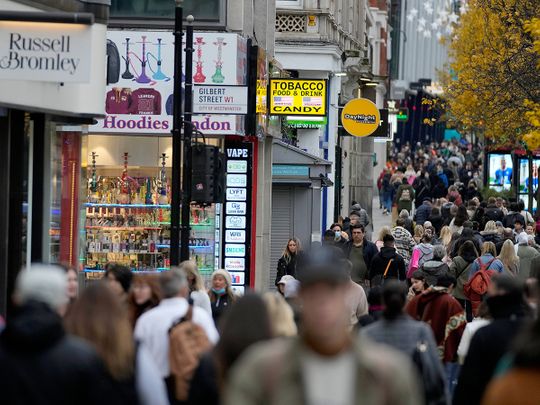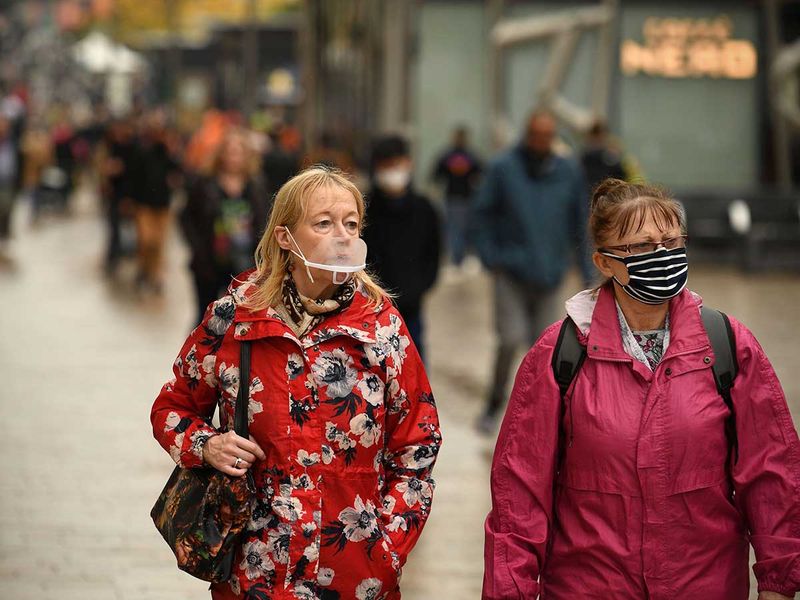
British retailers are drumming up new credit offers to encourage shoppers to spend more during one of the most challenging Christmas periods for business in years.
For the first time in a decade, department store John Lewis Partnership Plc, a favorite of middle-class Britons, has lowered the threshold for interest-free loans to 500 pounds ($608) from 1,000 pounds. High Street mainstays Marks & Spencer Group Plc and Currys Plc are also offering more attractive financing options to tempt shoppers into splurging, and Frasers Group Plc is planning to launch a credit product as well.
Also read
"Credit has come into its own in the cost-of-living crisis," said Alex Baldock, chief executive officer of electronics seller Currys.
While retailers have always provided financing, the flurry of new offers "- including interest-free proposals that cost the shops more to fund "- indicate how hard-fought this Christmas will be. With inflation at a four-decade high and energy bills set to surge, consumers are pulling back on discretionary spending.
'Don't take on more debt'
Retailers need to drive sales and cash flow during the festive period to help them shoulder their own cost burden as large rent, wage, tax and stock bills loom in January.
Critics warn stores are urging shoppers to take on more debt at a dangerous time. The UK is in a recession and real incomes are falling, making it harder to repay borrowings. About 30 per cent of British consumers are already depending on loans and Buy Now, Pay Later programs to fund Christmas this year, according to a survey by e-commerce agency RVS Media.
"There's a risk of people piling borrowing on top of borrowing," said Matthew Upton, director of policy at charity Citizens Advice. "As living costs spiral, the number of people who will see credit as the answer will grow, showing just how much people are struggling to get by."

Unregulated Buy Now, Pay Later arrangements "- point-of-sale financing that allows shoppers to make purchases and pay at a future date, often without interest "- are particularly dangerous, according to Labour MP Stella Creasy, who is campaigning for regulation of the industry. "Many end up spending more than they meant to by using it. I'm urging retailers not to offer it."
There are clear signs shoppers are borrowing more, and not just on Christmas gifts. The average size of an Iceland Foods loan has increased to about 70 pounds from 55 pounds earlier in the year as consumers feel the pinch, according to Fair for You, the not-for-profit consumer lender partnering with Iceland.
The grocer's micro loans, which let customers pay for food in installments, are so popular that last week 4,000 loans were issued on a single day, amounting to more than 250,000 pounds.
Bigger Baskets
Consumers borrowed 400 million pounds on credit cards in October, up from 100 million pounds the month before, according to Bank of England data. The growth rate in consumer credit reached 7.2 per cent in September, the highest since March 2019.
More and more retailers are providing a range of credit options, partly because it often leads to bigger basket sizes, said Peter Hewlett, fintech leader at PwC.
Frasers is preparing to launch its own regulated Buy Now, Pay Later platform, Frasers Plus, in coming months, along with a loyalty scheme across the group. Shoppers, for example, will be able to gain rewards at Sports Direct and spend them at Flannels, CEO Michael Murray said in a phone interview.
M&S is planning to extend its regulated digital credit account to be used in its stores by Spring. Currently customers using Sparks Pay can spend as much as 500 pounds interest-free on the app or website.

Credit Costs
Rising interest rates mean offering interest-free credit doesn't come cheaply for retailers. Stores are paying more to firms like Novuna and Barclays Partner Finance, who receive a slice of each sale in exchange for providing the consumer credit.
The key question is whether more consumers are defaulting. The answer appears to be not yet.
Next Plc, which has a major regulated finance arm, said in September that customer defaults are below pre-Covid levels and shoppers are paying down more of their balance each month than before. But The Very Group, which has always offered flexible financing as part of its business, set aside an extra 5 million pounds in October "for prudence" in case defaults rise.
"When times are straitened, the majority of folks will shop around for affordability," said Clive Black, a retail analyst at Shore Capital. "Those retailers who have capability for safe and reliable credit will probably capture market share."












